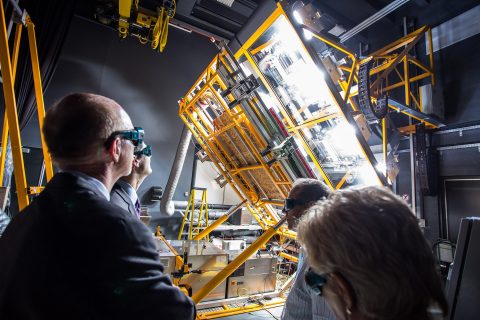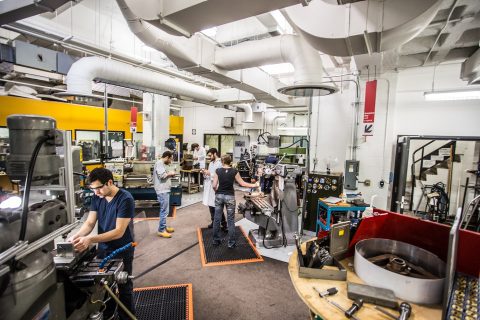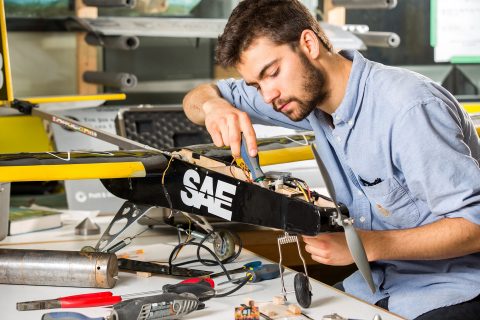Mechanical Engineering (BEng)
Virtual information sessions
Want to know how we're training the next generation of engineers and computer scientists? Join us to learn about the Gina Cody School's undergraduate programs and plans to advance integrated technologies in a socially responsible manner.
Why study Mechanical Engineering?
Build engines. Design robots. Control explosions. As a mechanical engineer, you will create, construct and control machines. Whether it’s a vehicle, an aircraft engine or an assembly line, mechanical engineers know how to make things run.
Our state-of-the-art labs — such as the Engineering Design and Manufacturing and Flight Control lab — will give you experience with the tools you’ll use in the field. Through labs, lectures and projects, you’ll also:
- Study the fundamentals of mechanics and materials, vibration analysis, heat transfer, and fluid mechanics
- Design, integrate and analyze mechanical, control and feedback systems and processes
- Design and build a wind turbine or particle accelerator
Our program is accredited by Engineers Canada and you'll graduate eligible to become a registered professional engineer.
Program highlights
- Concordia’s branch of the Canadian Society for Mechanical Engineers (CSME) focuses on getting students hands-on opportunities with 3D printing.
Special funding for out-of-province students
Up to $4000 for undergraduate programs.
Program structure
A Bachelor of Engineering degree takes a minimum of four years (120 credits) of full-time study, depending on your academic background.
Program options
Courses
Course sequences
Sample projects
- Convert an electronic fuel-injected gasoline engine to run on methanol
- Design a solar heating system
- Develop an off-road four-wheel drive, hydrostatic vehicle
- Design a flight or car simulator
Co-op program
The Co-op program gives you the chance to complete paid work terms that last 12 to 16 weeks. As a Co-op student, you will work for engineering firms where you may:
- Develop a pre-heating chamber for galvanization processes
- Create and review mechanical and technical drawings
- Design mechanical parts
- Research composite materials used in aircraft
Admission criteria
Minimum cut-off averages and course requirements
- Quebec CEGEP: 25 overall, 23 math, 22 physics
- Admission is based on applicants’ overall, math and physics CRC indicated above and completion of the following classes as part of their DEC: General Chemistry 1; Calculus 1 and Calculus 2 and Linear Algebra; Mechanics and Electricity and Magnetism.
- Students completing one of the eligible technical DECs may qualify for admission without the listed prerequisites. However, if the prerequisites are taken, a minimum of 23 in math and a 22 in physics are required.
- Eligible technical DECs include 241.A0, 244.A0, 280.B0, 280.C0, 280.D0
- Advanced standing may be possible
- Additional information for CEGEP applicants
- High school: B overall, B in math, B in physics
- One math from Pre-Calculus, Calculus, or equivalent
- Grade 12 or university-preparatory physics
- Canadian curricula course requirements
- Accepted international qualifications
- ACT or SAT is not required
- AP exams are not required but may qualify you for advanced standing
- Indigenous Bridging Program: First Nations, Inuit and Métis students who do not meet Concordia’s conventional admission requirements may be eligible for admission through the Kaié:ri Nikawerà:ke Indigenous Bridging Program
- International Baccalaureate (IB) diploma: 29 overall, 4 HL or 5 SL math, 5 HL or SL physics
- one math (Applications and Interpretations HL, Analysis and Approaches HL or Analysis and Approaches SL)
- one of the math or physics courses must be completed at the HL level
- International Baccalaureate Career-related Programme (CP): 29 overall, 4 HL or 5 SL math, 5 HL or SL physics
- Same as International Baccalaureate Diploma Programme (DP) requirements
- Additional Career-related Programme (CP) course requirements
- Baccalauréat français: 13 overall, 13 in math, 13 in science
- Required courses:
- Première: Spécialité mathématiques and Spécialité physique-chimie
- Terminale: Spécialité mathématiques (also accepted, Spécialité Physique-Chimie and Mathématiques Complémentaires)
- Additional information for Baccalauréat français applicants
- Required courses:
- British system of education (GCE):
- A-levels: At least two A-level exams BB, B in math, B in physics or
- AS-levels: At least 4 AS-level exams with equivalent results or
- BTEC: Level 3 Diploma or Extended Diploma in a related subject area with equivalent results
- Students without math or physics A-levels may be admissible based on AS-level or iGCSE/GCSE/O-Level exam results. Students should include all their exam results from iGCSE (or equivalent) onwards to support their application.
- Additional information for British System of Education (GCE) applicants
- University transfer (internal): 2.5 overall, 2.5 in math/physics, 2.0 in courses offered by the Gina Cody School of Engineering and Computer Science
- At least two of the following (or equivalent): MATH 203, 204, 205
- PHYS 204 or 205 (or equivalent)
- University transfer (external): B overall, B in math, B in physics
- Courses in the disciplines of Calculus, Chemistry and Physics
Minimum cut-off averages should be used as indicators. The cut-off data may change depending on the applicant pool. Applicants who meet the stated minimum requirements are not guaranteed admission to these programs.
Application deadlines
It’s not too late to apply
Most undergraduate programs are still accepting applications for fall 2025.

FALL ENTRY (September)
Deadline: March 1
International applicants: Apply no later than February 1 to allow time for immigration document processing. However, applying earlier is strongly recommended. Immigration processing times vary by country, and delays could prevent you from starting your studies on time.

WINTER ENTRY (January)
Deadline: November 1
International applicants: Apply no later than August 1 to allow time for immigration document processing. However, applying earlier is strongly recommended. Immigration processing times vary by country, and delays could prevent you from starting your studies on time.
We reserve the right to close admission to a program at any time after the official deadline without prior notice.
Funding note
Quebec residents who enroll in certain programs and meet the eligibility criteria may apply for funding of $2,500 per term through the Quebec Perspective Bursary (Bourse Perspective Quebec).
United States students: A U.S. Federal Student Aid-eligible version of this program is offered. This version meets all U.S. regulations (such as no co-operative education or e-courses) for eligible programs.
After your degree
Mechanical engineering alumni have established careers in a range of fields. Many take project management positions in manufacturing, machinery, automotive design, transportation, power generation and management, or robotics and biomechanics. Some have been hired by:
- GE Healthcare
- Dassault
- Phosco Lighting
- CMC Electronics
- Kiewit
- Ford Motor Company
Student story

Afroza Khanam Chowdhury
Bachelor of Engineering Option: Mechanical Engineering
Beyond the classroom, Afroza’s classmates work together and make the most of what Montreal has to offer.
Other programs of interest

Protect water resources. Design buildings, bridges and tunnels. Improve transportation and traffic flow. As a civil engineer, your expertise in urban and environmental planning lets you guide municipalities to create the structures and systems that have a positive impact on everyday community life.
Department
Department of Building, Civil and Environmental Engineering
Faculty

Use your knowledge of human behaviour, equipment, information and modes of communication to develop processes that work. Industrial engineers are experts in optimization who apply mathematics, engineering and psychological principles to improve productivity, safety and quality. A knack for project management can lead to a career in many different economic sectors.
Department
Department of Mechanical, Industrial and Aerospace Engineering
Faculty



